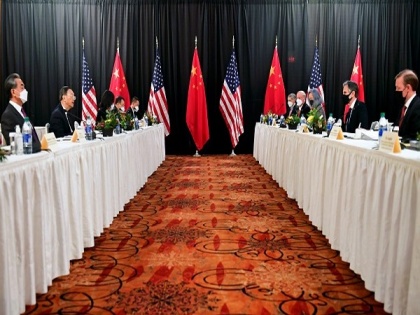China's aggressive stance at Alaska meet suggests more confrontational posture in future
By ANI | Published: March 20, 2021 03:39 AM2021-03-20T03:39:02+5:302021-03-20T03:45:15+5:30
A heated exchange between US and Chinese diplomats at Alaska, a manifestation of a newly combative and unapologetic Beijing, is signalling a more confrontational and confident China.

China's aggressive stance at Alaska meet suggests more confrontational posture in future
A heated exchange between US and Chinese diplomats at Alaska, a mfestation of a newly combative and unapologetic Beijing, is signalling a more confrontational and confident China.
China's top diplomat, Yang Jiechi, delivered a 16-minute rant at Anchorage during the meeting with US State Secretary Antony Blinken and National Security Advisor Jake Sullivan, accusing them of condescension and hypocrisy, reported the New York Times.
China's more aggressive diplomatic posture is likely to further intensify tensions with the US and its hardening views have already surfaced in activity along its borders and in its surrounding waters, where it fought Indian troops last year and menaced ships from several countries, including Japan, Malaysia and Vietnam. This stance has led to warnings of the potential for a dangerous escalation.
"We're not predicting that there will be a war between the United States and China over Taiwan, but we are worried about it," said Robert D Blackwill, a fellow with the Council on Foreign Relations on Thursday.
Steven Lee Myers for the New York Times writes that the Chinese believe that Americans no longer have an overwhelming reservoir of global influence, nor the power to wield it against China.
This has made China more confident than once was in pursuing its aims openly and unabashedly -- from human rights issues in Hong Kong and Xinjiang to territorial disputes with neighbouring countries.
For decades, China approached American governments from positions of weakness, economically and militarily. However, China feels far more assured today in its ability to challenge the US.
Beijing's view has been reinforced by the COVID-19 epidemic, which it has largely controlled at home while devastating the US.
"The challenges facing the United States in human rights are deep-seated. It's important that we manage our respective affairs well instead of deflecting the blame on somebody else in this world," said Yang.
The shift in China's strategy is not simply rhetorical, or "grandstanding" for a domestic audience, as a senior official traveling with Blinken suggested.
The Biden administration's stated strategy for dealing with China has been to build coalitions of countries to confront and deter its behaviour. Ahead of Alaska meet, it imposed sanctions on 24 Chinese and Hong Kong officials.
"This is not supposed to be the way one welcomes his guests," China's foreign minister, Wang Yi.
Wang also remarked that neither the United States nor the West broadly had a monopoly on international public opinion, reported the New York Times.
"I don't think the overwhelming majority of countries in the world would recognize that the universal values advocated by the United States or that the opinion of the United States could represent international public opinion... And those countries would not recognize that the rules made by a small number of people would serve as the basis for the international order," he said.
The confrontation played well with the domestic audience in China, judging by the reactions on the country's carefully censored social media sites, according to the New York Times.
"Nowadays, who else but China would dare to put the United States in a corner like this on American territory?" one user on Weibo wrote
Meanwhile, White House Principal Deputy Press Secretary Karine Jean-Pierre on Friday said that the US will move along the path of diplomacy even as it continues having tough conversations with China.
"We knew this was going to be a tough discussion, a frank discussion, and -- but we're still moving towards diplomacy, and that is the goal here. And every relationship with every country is different. And so we are just going to continue that, you know, as I quoted from Jake and Secretary Blinken -- from Jake Sullivan, the National Security Advisor, and Secretary Blinken," she said.
"America's approach will be undergirded by confidence in our dealing with Beijing, which we are doing from a position of strength, even as we have the humility to know that we are a country internally striving to become a more perfect union ourselves," she added.
The first high-level meeting between the Biden administration and China in Alaska saw acrimonious exchanges between US and Chinese officials, indicating the deep divide between the two sides despite the change of guard at the White House.
( With inputs from ANI )
Disclaimer: This post has been auto-published from an agency feed without any modifications to the text and has not been reviewed by an editor
Open in app